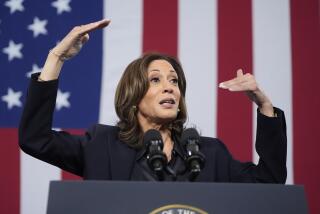Democrats sound populist themes
- Share via
COLUMBUS, OHIO — The nation’s economic anxieties took center stage in the increasingly rancorous Democratic presidential race Thursday as Hillary Rodham Clinton and Barack Obama tilted their campaigns toward blue-collar voters in the upcoming Wisconsin and Ohio primaries.
Both candidates tweaked their advertising and campaign messages to deliver stinging television ads and stress populist economic themes. Despite focusing openly on Ohio, which holds its primary March 4, Clinton prepared to spend much of the weekend in Wisconsin, where her campaign was diverting resources to match Obama’s organization and week-old media campaign. The Wisconsin primary is Tuesday.
While the New York senator toured an auto plant in Lordstown, Ohio, and brandished a pair of boxing gloves given to her by General Motors executives and workers -- a nod to her sharpened attacks on her rival for spurning further debates -- Illinois Sen. Obama was in the process of securing endorsements from two major labor unions.
A day after he visited a GM factory in Janesville, Wis., to unveil his $210-billion plan to create construction and “green industry” jobs, Obama won the backing of the United Food and Commercial Workers. According to union officials, he also was on the verge of an endorsement from the Service Employees International Union.
Those assets are expected to give him firepower; Clinton has strong backing from unionized teachers and public service employees in Ohio, Wisconsin and Pennsylvania, whose primary is April 22.
Clinton also had sought endorsements from both unions, winning earlier backing from the SEIU New York local and several other chapters. But the national SEIU’s endorsement -- representing 1.5 million public service workers and nurses -- would trump those moves.
Both unions have long been critical of Wal-Mart, the giant national discount chain. Clinton was a Wal-Mart board member in the late 1980s.
The UFCW move is a body blow to Clinton because the union, with more than 1.4 million grocery and food processing workers, has more than 70,000 members in Ohio. It has even more influence in Ohio than the United Steelworkers, which has yet to endorse in the Democratic race.
In another possible sign of Clinton’s struggles, reports surfaced Thursday night that Rep. John Lewis (D-Ga.), a hero of the civil rights movement, was considering switching his endorsement -- and superdelegate vote -- from Clinton to Obama. However, a Lewis spokeswoman, Brenda Jones, told The Times that Lewis’ stance had not changed.
But Clinton did have news to cheer about Thursday, learning from New Mexico Democratic Party officials that she had squeaked by with a victory in that state’s caucuses.
After party officials counted more than 17,000 provisional ballots from the Feb. 5 contest, they announced that Clinton had won 48.8% of the vote to Obama’s 47.6%, giving her 14 delegates to his 12.
Earlier in the day, during her visit to the Lordstown GM plant, Clinton tried to cast Obama as beholden to special interests, and she released a plan to cut tax breaks for the oil industry and to limit fees and impose other rules on the insurance, credit card, student loan and other industries.
Clinton said she would “rein in the special interests and save the American people at least $55 billion a year -- money that can go back into your pockets, money we can use to create new jobs, rebuild our infrastructure, make college affordable and so much more.”
She went on to criticize Obama for letting the “nuclear industry water down” a Senate bill he had championed to regulate nuclear power plants. She was referring to Exelon Corp., a Chicago-based nuclear plant operator that has contributed more than $200,000 to Obama since 2004.
Obama spokesman Bill Burton responded: “Barack Obama doesn’t need any lectures on special interests from the candidate who’s taken more money from Washington lobbyists than any Republican running for president.”
Clinton also continued to press Obama to agree to more debates. Obama has agreed to debates in Texas and Ohio, but in a conference call with reporters, Clinton tweaked her rival, suggesting she had bettered him in earlier bouts.
“Maybe he doesn’t want to answer tough questions,” she said.
Burton replied: “I’m sure she thinks she does well in them. But the truth is we have debated and we’ll continue to debate.”
Obama had no campaign events Thursday, but his Wisconsin operation was in full swing.
According to several Wisconsin party veterans, Obama operatives set up in the state nearly four weeks ago, aided by strategy advanced by Wisconsin Gov. James E. Doyle, an early Obama endorser.
“Wisconsin is a strong union state, and the real battle is going to be over blue-collar, Catholic voters in places like Green Bay and Janesville,” said Mike Tate, a Milwaukee-based political strategist who headed Democrat Howard Dean’s presidential campaign in Wisconsin in 2004.
Obama’s automated calls have been up for nearly a week, reaching 10,000 households each day, one party veteran said; and the candidate’s television ads, stressing his response to U.S. job losses caused by outsourcing, ran for a solid week in Milwaukee, Madison and Green Bay markets without a response from Clinton.
Clinton’s campaign finally began running television ads Wednesday, criticizing Obama for not debating in the state. A Clinton ground operation set up two days ago in Madison, but it faces an Obama team that had spread across the state over the last month.
--
stephen .braun@latimes.com
tom.hamburger@latimes.com
Hamburger reported from Columbus and Braun from Washington.
More to Read
Get the L.A. Times Politics newsletter
Deeply reported insights into legislation, politics and policy from Sacramento, Washington and beyond. In your inbox twice per week.
You may occasionally receive promotional content from the Los Angeles Times.










